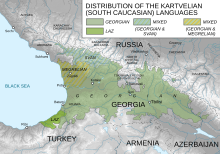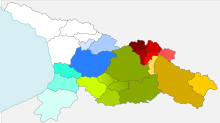Georgian language
| Georgian ქართული Kartuli |
||
|---|---|---|
|
Spoken in |
|
|
| speaker | 4 million | |
| Linguistic classification |
|
|
| Official status | ||
| Official language in |
|
|
| Language codes | ||
| ISO 639 -1 |
ka |
|
| ISO 639 -2 | ( B ) geo | ( T ) cat |
| ISO 639-3 |
cat |
|
The Georgian language (own name ქართული ენა Kartuli ena , also Grusinisch or Gruzinisch ) is the official language in Georgia and is spoken there of about 4 million people (as of 2013).
Georgian is one of the South Caucasian languages , along with Mingrelian , Lasian and Swanian . The alphabet Mchedruli , which has 33 letters, is used to write the Georgian language .
Phonology
Georgian has five vowel phonemes and 28 consonant phonemes , including ejectives . The consonants can form very large consonant clusters (e.g. the name of the Georgian city of Mtskheta , or, as an extreme example, the Georgian tongue twister "you peel us" or "you ruin us": gvprtskvnit ). Each phoneme is represented by a specific Georgian letter .
The emphasis is very weak and indistinguishable. With two- and three-syllable words it is usually on the first, and with four-syllable words on the second syllable . In contrast to German, yes-no questions are answered with a rising-falling intonation. Every Georgian noun in the nominative ends with a vowel.
grammar
Both agglutination and root flexion are characteristic of the Georgian language . A peculiarity is the lack of grammatical gender ( gender ), and the noun knows neither a definite nor an indefinite article .
Instead of the prepositions customary in German, for example, Georgian uses postpositions that either stand alone or can be added to the noun. A German example of a post position is “along the river”. Georgian has 7 cases ( nominative , dative , genitive , instrumental , adverbial ( essive and translative ), vocative and ergative ). The ergative occurs as a subject case with certain verb forms, namely in the aorist and optative transitive verbs. So Georgian is a split- ergative language . As in most inflected languages , word order is relatively free. The conjugated forms of the verb mark a reference to both the subject and the direct or indirect object of the sentence. So there are not only separate forms for “I see” ( v xedav ), “you see” ( xedav ) etc., but also for “I see you” ( g xedav ), “I see you” ( g xedav t ) , "You see me" ( m xedav ), "you see us" ( gv xedav ), "you see him" ( ( h ) xedav ) etc.
While the Indo-European languages use different times to represent the present, the past, the future and the possible, eleven so-called mtskrivi (series) are used in Georgian . They also assign a certain verb form to the time of the event, but not only does agglutination change the verb, but also the subject and object of the sentence change the case in which they stand. For example, in the forms of the present and future tense group, the subject is mostly in the nominative, in the forms of the aorist group partly in the nominative, partly in the ergative (depending on the transitivity of the verb) and in the forms of the perfect group in the dative; the case of the object changes similarly. The high number of irregularly inflected (especially suppletive ) verbs is also striking. For example the verb for “to say”, which has several stems: eubneba (present tense) “he tells him”, 'et'q'vis (future tense ) “he will tell him”, utxra (aorist) “he said it him / told him ”, utkvams (perfect)“ he (obviously) told him ”.
vocabulary
Georgian has borrowed numerous loanwords from ancient Greek , Latin , Persian , Arabic , Armenian , Russian and (in recent years) English .
Numerals
The Georgian number system is mixed decimal up to 100 - vigesimal . z. B .:
- 30th
- ოცდაათი (in Duden transcription - "ozdaati") = literally twenty and ten .
- 35
- ოცდათხუთმეტი (in Duden transcription - "ozdatchutmeti") = literally twenty and fifteen .
- 40
- ორმოცი (in Duden transcription - "ormozi") = literally two times twenty .
- 45
- ორმოცდახუთი (in Duden transcription - "ormozdachuti") = literally two times twenty and five .
- 50
- ორმოცდაათი (in Duden transcription - "ormozdaati") = literally two times twenty and ten .
- 55
- ორმოცდათხუთმეტი (in Duden transcription - "ormozdatchutmeti") = literally two times twenty and fifteen .
- 60
- სამოცი (in Duden transcription - "samozi") = literally three times twenty .
- 65
- სამოცდახუთი (in Duden transcription - "samozdachuti") = literally three times twenty and five .
- 70
- სამოცდაათი (in Duden transcription - "samozdaati") = literally three times twenty and ten .
- 75
- სამოცდათხუთმეტი (in Duden transcription - "samozdatchutmeti") = literally three times twenty and fifteen .
- 80
- ოთხმოცი (in Duden transcription - "otchmozi") = literally four times twenty , cf. french quatre-vingts .
- 85
- ოთხმოცდახუთი (in Duden transcription - "otchmozdachuti") = literally four times twenty and five .
- 90
- ოთხმოცდაათი (in Duden transcription - "otchmozdaati") = literally four times twenty and ten .
- 95
- ოთხმოცდათხუთმეტი (in Duden transcription - "otchmozdatchutmeti") = literally four times twenty and fifteen .
Dialects
The Georgian language is divided into 18 regional dialects , the borders of which correspond to the borders of historical regions of Georgia and which are divided into five main dialect groups according to their characteristics, and into a sociolect :
- Northwestern dialects
-
Southwestern dialects
- Gurisch ( Georgian გურული Guruli ) in the Gurien region ,
- Adjaric ( Georgian აჭარული Ach'aruli ) in today's autonomous region of Adjara ,
- Imerchewisch ( Georgian იმერხეული Imercheuli ) in the Imerchewi region, which today belongs to Turkey , Artvin province (here mainly off the coast in the mountains),
-
Central dialects
- Kartlisch ( Georgian ქართლური Kartluri ) in the Kartlien region , the most numerous dialect (excluding the Samtskhe -Javakheti regions, which are sometimes referred to as " Upper Kartlien " ),
- Mes'chisch ( Georgian მესხური Meschuri ) in the Meschetien region, in the Middle Ages and now again alternatively called Samtskhe (western part of the greater Samtskhe -Javakheti region ),
- Javakheti ( Georgian ჯავახური Javakheti ) in the Javakheti region (eastern part of the Samtskhe- Javakheti region),
-
Northeastern mountain dialects
- Mochewisch ( Georgian მოხეური Mocheuri ) in the Chewi region around the Darial Gorge on the upper Terek ,
- Mtiuletic-Gudamaq'risch ( Georgian მთიულურ-გუდამაყრული Mtiulur-Gudamaqruli ) south of it in the region of Mtiuletien-Gudamaqarien ,
- Chevsurian ( Georgian ხევსურული Chewsuruli ) in the Chewsureti region ,
- Pschawisch ( Georgian ფშაური Pschauri ) in the southern region of Pschawien ,
- India ink (et) ish ( Georgian თუშური Tuschuri ) in the region Tuschetien ,
-
Eastern dialects
- Kach (et) isch ( Georgian კახური Kachuri ) in the Kakheti region ,
- Tianetic ( Georgian თიანეთური Tianeturi ) in the Erzo-Tianetia region ,
- Ingiloic ( Georgian ინგილოური Ingilouri ) in the historical Saingilo region , today the Balakən and Zaqatala Rayons in Azerbaijan ,
- Ferejdan ( Georgian ფერეიდნული Pereidnuli ), dialect of the descendants of Georgian deportees to central Persia in the reign of Shah Abbas the Great at the beginning of the 17th century, who still live in the west of Isfahan Province , especially the Ferejdan district and the city of Ferejdun Shahr.
-
Sociolect
- Judeo-Georgian , the language form of the long-established Georgian Jews .

All dialects and also the sociolect Judaeo-Georgian are mostly understandable among each other and are increasingly approaching the high-level standard of the Georgian written language. In contrast, the related are South Caucasian (Kartvelian) languages that sanischen languages Mingrelian and Laz , and the Swanische with the Georgian no longer majority understood and therefore in the Caucasus studies classified as separate languages. Due to the common use of Georgian as the Georgian Orthodox church language since the early Middle Ages (in Lasistan, in northeastern Turkey only until Islamization in the 14th – 17th centuries, in the other areas until today), the speakers are spoken of these related languages in Georgia but still counted among the ethnic Georgians .
Surnames
Approx. 70% of Georgian surnames were formed from patronyms that ended in -dse (written: -ძე) (Old Georgian "son") or -schwili (written: -შვილი) ("child").
Many Georgian family names can be linguistically and dialectically assigned to specific regions of the country from which they originally come from.
- -dse (-ძე, patronymic): mostly West Georgian and Central Georgian (Cartlian) family names, e.g. B. Shevardnadze , Gamqrelidze , Chavchavadze
- -schwili (-შვილი, patronymic): mostly East Georgian and Cartlian surnames, with a few exceptions from West Georgia, e.g. B. Saakashvili , Zurabishvili , Jughashvili
- -eli (-ელი, formed toponymically ), like -schwili predominantly from East-, more rarely from West Georgia, e.g. B. Tsereteli
- -ia (-ია), -awa (-ავა) or -ua (-უა): Mingrelic family names, e.g. B. Gamsachurdia , Beria , Sigua , Melua , Eliawa
- - (i) ani (- (ი) ანი, patronymic): originally Svanese surname, but since the late Middle Ages, early modern times it has also spread to neighboring north-west Georgian mountain regions, e.g. B. Gelowani , Dadeschkeliani , Dadiani
- -uri (-ური), -uli (-ული): Khevuri family names and from neighboring north- east Georgian mountain regions, e.g. B. Swiadauri
- -schi (-ში): lasische family name (in Turkey since the Turkish surname law no longer receive, only in Georgia), for example. B. Chalwashi
literature
- Marine Bokhashvili: Introduction to the Georgian Script. Buske, Hamburg 2007, ISBN 978-3-87548-433-5 .
- Lia Abuladze, Andreas Ludden: Textbook of the Georgian language. 2nd, revised edition. Buske, Hamburg 2011, ISBN 978-3-87548-620-9 . (including audio CD).
- Marcello Cherchi: Georgian . LINCOM Europe, Munich / Newcastle 1999, ISBN 3-89586-119-7 .
- Farshid Delshad : Georgica et Irano-Semitica, Studies on Iranian and Semitic Loanwords in Classical Georgian, Philological Approaches towards Historical-Comparative Linguistics, Deutscher Wissenschafts-Verlag (DWV), Baden-Baden 2009.
- Chotiwari-Jünger, Steffi, Damana Melikischwili / Lia Wittek: Georgian verb tables. Buske, Hamburg 2010, ISBN 978-3-87548-510-3 .
- Georgij A. Klimov: Introduction to Caucasian Linguistics . from the Russian by Jost Gippert. Buske, Hamburg 1994, ISBN 3-87548-060-0 .
- Michael Jelden : German-Georgian Dictionary . Buske, Hamburg 2001, ISBN 3-87548-234-4 .
- Yolanda Marchev: German-Georgian dictionary . Caucasus Publishing House, Freudenstadt 1999.
- Heinz Fähnrich : Short grammar of the Georgian language. 3. Edition. Langenscheidt u. Publishing house Enzyklopädie, Leipzig u. a. 1993.
- Heinz Fähnrich: Kartwelische vocabulary studies . Friedrich Schiller University , Jena 2002, ISBN 3-9808569-1-7 .
- Heinz Fähnrich: Linguistic terms Georgian-German . Shaker Verlag , Aachen 2003, ISBN 3-8322-7231-3 .
- Kita Tschenkéli: Introduction to the Georgian language . Volume 1: Theoretical Part. Volume 2: Practical Part . Amirani, Zurich 1958, ISBN 3-85521-001-2 .
- Kita Tschenkéli: Georgian-German dictionary. 3 volumes. Zurich 1965–74. (New edition: 2007, ISBN 978-3-85521-002-2 )
- Lia Abuladze, Andreas Ludden: Basic Georgian vocabulary . Buske, Hamburg 2011, ISBN 978-3-87548-550-9 .
Web links
- German-Georgian dictionary by Michael Jelden
- Database for an electronic historical dictionary of the Georgian language (German, English, Georgian)
- Learn Georgian script online
- Transliteration from the Latin to the Georgian alphabet
- Online keyboard for Georgian
- Vocabulary trainer and Georgian grammar
Footnotes
- ↑ Kevin Tuite: The geography of Georgian q´e , pp. 5-6 , Georgij A. Klimov: Introduction to Caucasian Linguistics. Hamburg 1994, p. 90.
- ↑ For localization, cf. this ethnic map of Iran by Dr. M. Izady (Columbia University) : drawn south of Arak , east-north-east of Isfahan as "Georgians & Armenians".
- ^ Georgij A. Klimov: Introduction to Caucasian Linguistics. Hamburg 1994, pp. 88-94.
